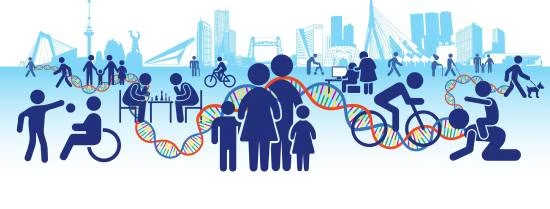The Master of Genomics in Society degree may lead to a career in genomic and social science research or to a position at a company or institute as a (genomic) impact researcher, university teacher, policy maker, (science) communicator and consultant.
What will be your professional profile?
Our students are trained to become T-shaped professionals. You gain in-depth expertise in the field of genomics, while broadening your knowledge to include psychology, governance, ethics, and entrepreneurship. With this T-shaped profile, you will be able to synergize between different fields, speak and connect their languages, while remaining focused on scientific and societal issues at stake. You will be trained in doing interdisciplinary research that is tailored to the future roles and positions of you as a bridge builder between Genomics and Society.
At the end of the 2-year research master Genomics in Society you will:
- Be equipped with the biomedical scientific c and social-scientific c research methods that are part of the interdisciplinary research field Genomics in Society.
- Be able to apply knowledge of Genomics as an interdisciplinary discipline focusing on structure, function, evolution, and of practical application with current and latest genetic techniques, tests and methods such as mapping and editing of genomes.
- Be able to analyze (big) genomic data and translate them to personal -, family and population level, to investigate and to reflect on their impact.
- Be able to use ethical reference frameworks for the design, implementation, and assessment of research into genomics in society.
Research:
- Will be equipped to identify societal issues related to genomics and translate them into innovative research proposals with the potential to achieve positive societal impact.
- Be able to align with stakeholders throughout the research cycle in order to investigate issues of genomics in society in a process of divergence and convergence.
- Be able to design, conduct, and report interdisciplinary research in the field of Genomics in Society.
- Be able to analyze, discuss, and reflect on moral ethical issues related to research and the application of genomics in society.
Society:
- Will be equipped to employ appealing and appropriate forms of written and oral communication within the academic- and within the societal context.
- Have developed the competencies to collaborate with stakeholders from science, government, business, and society and participate in dialogue about the impact of implementation of genomics in society.
Professional identity:
- Will be able to represent yourself in a professional manner as an interdisciplinary researcher in different contexts using a standard of professional behaviour (bridge-building, open-minded and ethical orientation) which will allow you to effectively navigate the domain of Genomics in Society and its various stakeholders.
- Have developed an open, curious and entrepreneurial attitude to transforming societal issues into genomic research.
- Have developed the attitude and skills to keep up his/her own expertise in a complex and rapidly developing field of research.

